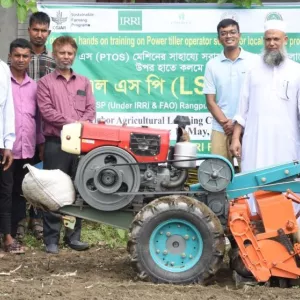Training on mechanized direct-seeded rice (DSR) for precision sowing empowers local service providers in Nilphamari, Bangladesh
by Sharif Ahmed, Abdullah Miajy, Abdul Haque, and Humnath Bhandari In northern Bangladesh, the widespread adoption of mechanized Direct-Seeded Rice (DSR) remains slow due to limited access to suitable seeding machines and lack of skilled operators. These constraints prevent farmers from fully benefiting from climate-smart technologies, especially as they face the increasing challenges from labor shortages, rising input costs,

Training on mechanized direct-seeded rice (DSR) for precision sowing empowers local service providers in Nilphamari, Bangladesh

by Sharif Ahmed, Abdullah Miajy, Abdul Haque, and Humnath Bhandari
In northern Bangladesh, the widespread adoption of mechanized Direct-Seeded Rice (DSR) remains slow due to limited access to suitable seeding machines and lack of skilled operators. These constraints prevent farmers from fully benefiting from climate-smart technologies, especially as they face the increasing challenges from labor shortages, rising input costs, and unpredictable rainfall patterns driven by climate change.
In response, the CGIAR Sustainable Farming Science Program (SFP), in collaboration with the Farm Machinery Division of the Bangladesh Agricultural Research Institute (BARI), organized a hands-on training on precision sowing through mechanized Direct-Seeded Rice (DSR). The training aims to equip the rural youth and service providers with the necessary skills to implement this technology using two-wheel power tiller-operated seeder (PTOS) machines to adopt a DSR system.
Led by Senior Scientist Dr. Muhammad Arshadul Hoque from the Farm Machinery Division of BARI and coordinated by Agri-Food Systems Specialist Abu Abdullah Miajy from the International Rice Research Institute (IRRI)-Bangladesh, the training involved 15 local service providers (LSPs), including five from the Food and Agriculture Organization (FAO) mechanization project in Kishoreganj, Nilphamari, Rangpur, Bangladesh. They learned about precision seeding techniques and how to operate seeding devices.
“From today’s training, I learned how to properly operate and maintain the PTOS machine for direct sowing of crops like rice, maize, mustard, wheat, sunflower, lentil, and jute. This enhanced my skills and now I feel confident as a PTOS operator,” said Md. Abdul Hie, an LSP from Nilphamari, Bangladesh.
He also added that he aims to use the machine in the upcoming Aman season (June to November) to directly sow rice seeds in 65–70 acres of land, which will help him and farmers in his area earn a better income….

